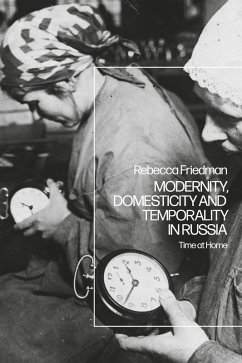Revolution, war, dislocation, famine, and rivers of blood: these traumas dominated everyday life at turn-of-the-century Russia. As Modernity, Domesticity and Temporality in Russia explains, amidst such public turmoil Russians turned inwards, embracing and carefully curating the home in an effort to express both personal and national identities.
From the nostalgic landed estate with its backward gaze to the present-focused and efficient urban apartment to the utopian communal dreams of a Soviet future, the idea of time was deeply embedded in Russian domestic life. Rebecca Friedman is the first to weave together these twin concepts of time and space in relation to Russian culture and, in doing so, this book reveals how the revolutionary domestic experiments reflected a desire by the state and by individuals to control the rapidly changing landscape of modern Russia.
Drawing on extensive popular and literary sources, both visual and textual, this fascinating book enables readers to understand the reshaping of Russian space and time as part of a larger revolutionary drive to eradicate, however ambivalently, the 19th-century gentrified sloth in favour of the proficient Soviet comrade.
From the nostalgic landed estate with its backward gaze to the present-focused and efficient urban apartment to the utopian communal dreams of a Soviet future, the idea of time was deeply embedded in Russian domestic life. Rebecca Friedman is the first to weave together these twin concepts of time and space in relation to Russian culture and, in doing so, this book reveals how the revolutionary domestic experiments reflected a desire by the state and by individuals to control the rapidly changing landscape of modern Russia.
Drawing on extensive popular and literary sources, both visual and textual, this fascinating book enables readers to understand the reshaping of Russian space and time as part of a larger revolutionary drive to eradicate, however ambivalently, the 19th-century gentrified sloth in favour of the proficient Soviet comrade.


